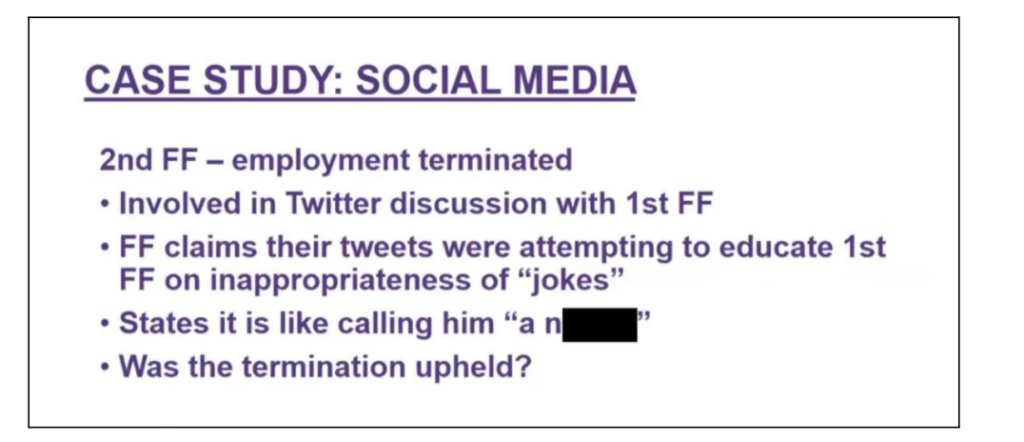Toronto’s George Brown College is offering students trauma counselling and telling them they can file a human rights complaint after a guest lecturer said and displayed the “N-word” in a presentation last week.
The lecturer, Markham deputy director of people services Janet Ashfield, has been placed on leave despite apologizing — causing outrage from scholars supportive of academic freedom.
According to CBC News, the incident occurred Wednesday when Ashfield was speaking virtually to human resources management students. As part of her presentation, she offered a real-world case study of two firefighters losing their jobs over offensive social media posts, and asked students how they would have dealt with the situation.
She quoted one of the offensive posts that contained the “N-word”, saying the word out loud. The word was also not blurred out in her presentation – though was censored in a screenshot in CBC’s article.

The latter triggered some students, with one confronting Ashfield to ask her to respond to comments in the chat. Ashfield responded to concerns about her use of the word by saying “you are absolutely right. That is an absolutely inappropriate word to be used, but that’s the word that was used.”
“Clearly, it’s uncomfortable, but you cannot work around words and say, ‘Well, you know, it was really inappropriate what they said,'” the lecturer said. “I need to know what they said. I need to understand what they said in order to go forward.”
Students however disagreed with her, with one saying “I don’t agree that it should be said at all, especially from someone who’s Caucasian. It’s a very racist term.”
The student’s sentiments were echoed by Equity, Diversity and Inclusion (EDI) strategist Destiny Udoh, who told CBC it is unacceptable to use the “N-word” in an academic context.
Following the incident, George Brown President Gervan Fearon issued a statement stating that the school had launched an investigation into the matter. “Giving embodied voice and life to the N-word and other racial slurs is completely unacceptable, inhumane and undermines efforts to create a safe and broadly supportive and inclusive learning environment,” the statement reads.
Fearon said that the incident was “harmful and can be a traumatizing experience,” adding “we are connecting directly with the students from the class to provide any and all supports necessary and have made counselling support available through our Counselling and Student Well-being Team.”
Students were also told they could discuss the matter with the college’s Anti-Racism, Equity and Human Rights office and “make a complaint with a Human Rights Advisor. ”
Following the lecture, Ashfield sent a letter to the class and to the media where she apologized for using the “N-word”, noting she had not previously said the word out loud when doing her presentations.
“In my attempt to teach students about fostering a safe and respectful workplace, I used inappropriate language that contradicted my core objectives for the discussion,” reads the letter sent to CBC.
“My intention was to provide an informative presentation, but I know that regardless of the context in which the language appeared, it is unacceptable in all circumstances.”
Ashfield has been placed on administrative leave by the City of Markham, with spokesperson Bryan Frois saying the city “stands firmly against all forms of hate, racism and discrimination.”
The treatment of Ashfield by students, the university and her employer was condemned by the Society for Academic Freedom and Scholarship (SAFS), who sent a letter to Fearon defending her.
SAFS president Mark Mercer told True North that Ashfield “had nothing to apologize for” as “she did absolutely nothing wrong”. He added that “the students themselves, though, by complaining about Ashfield’s mention of the word, are asking to be coddled and treated disrespectfully.”
Mercer says the most unfortunate thing about the incident are the actions of the professor and Fearon, noting that “both are academics whose first concern should be with the academic mission of their institution.”
“To seek to ban words and to advocate punishment for those who use or mention certain words is to destroy the ethos of openness and candour that should mark any place of higher learning.”
This is not the first time that the use of the “N-word” in an academic context has caused controversy in Ontario’s postsecondary institutions. University of Ottawa professor Verushka Lieutenant-Duval faced harsh criticism from students and activists in September 2020 after she said the “N-word” in her Art and Gender class while explaining how certain marginalized groups have reclaimed slurs.
Lieutenant-Duval was suspended and says she was doxxed by a disgruntled student, who published her phone number and personal email address online.
In response to the incident, the University of Ottawa formed an academic freedom committee which concluded that freedom of expression needed to be affirmed and warned against censorship.
A George Brown College spokesperson would not comment on if the school had considered academic freedom implications of Wednesday’s event, opting instead to send True North Fearon’s Mar. 16 statement on the matter.
The Toronto college previously made headlines for requiring that students declare that they benefited from the “colonization and genocide of Indigenous people” in order to be allowed into online classes — amid its adoption of an “anti-racism action plan” calling for the prioritization of decolonization and equity values.

